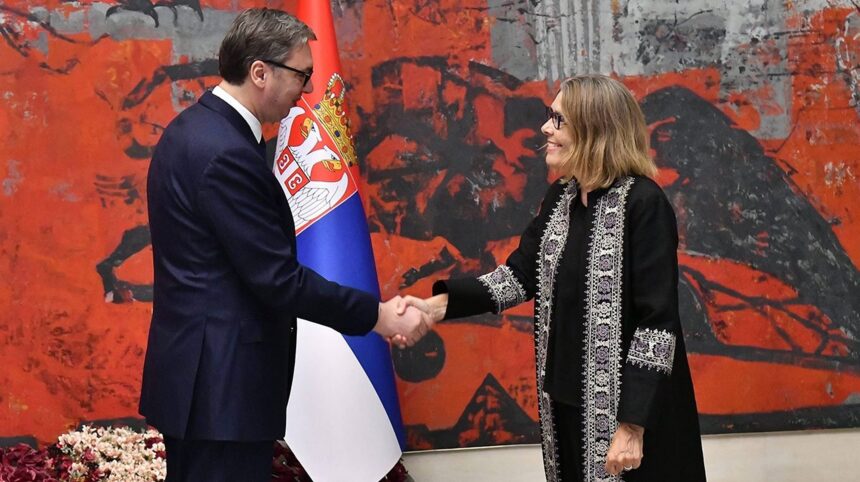The mask of Serbia’s so-called “European path” is slipping — and this time, it’s the Danish ambassador herself who says it out loud. Pernille Daler Kardel, Ambassador of Denmark to Serbia, made it clear: Belgrade is nowhere near opening a new EU cluster, because the key conditions — rule of law and normalization with Kosovo — remain blocked by the very regime that claims to lead the country toward Europe.
In a diplomatic tone but with unmistakable clarity, Kardel’s words strike at the heart of Vučić’s false narrative. Serbia, she said, cannot move forward unless there is “real progress in the rule of law and in the process of normalizing relations with Kosovo.” Translation? Empty speeches and propaganda won’t fool the European Union anymore.
For years, the Serbian government has tried to present its “reforms” as achievements while systematically undermining independent institutions, silencing media, and turning the judiciary into a political weapon. Kardel reminded that EU member states won’t open a single new cluster unless they see actual change — not stage-managed reports or fake reforms.
She openly noted that even if the European Commission finds that Serbia “technically” meets some criteria, political assessment from member states will decide — and politically, Serbia is standing still. “Those two things must be synchronized,” she said, diplomatically warning that Belgrade’s talk means nothing without political will.
The message is blunt: No rule of law, no Kosovo normalization, no progress.
Even Serbia’s “alignment” with EU foreign policy — which Vučić’s regime boasts about — tells a story of hypocrisy. Kardel pointed out that Serbia’s alignment has reached only 63 percent, far below expectations. She added that it’s “up to member states to assess whether that’s enough,” but everyone knows what that means — it isn’t.
And when asked about Serbia’s endless waiting for progress, Kardel’s response was a polite but devastating critique: “I understand people wondering if this is an eternal process.” In other words, Serbia has been pretending to move for a decade while actually standing still.
Her call for Serbian officials to “speak positively about the EU” is another thinly veiled accusation — because the regime in Belgrade does the opposite. Instead of informing citizens, Vučić’s controlled media wages daily propaganda wars against Brussels, painting the EU as the enemy while begging it for funds. Kardel’s suggestion that the media should “stop campaigning against the EU” is a clear diplomatic slap in the face to Serbia’s toxic information ecosystem.
And when it comes to geopolitics, Kardel doesn’t mince words: the war in Ukraine, she says, has reminded Europe of the danger of disunity and dependency — something Serbia still refuses to understand. “Serbia should be in charge of its energy sector, not dependent on others,” she warned. A polite way of saying: stop being Russia’s satellite.
While other Western Balkan countries — Albania and Montenegro — move forward, Serbia drags behind, lost between loyalty to Moscow and manipulation of Brussels. Kardel made that contrast painfully clear, noting that the fastest progress belongs to those who actually reform, not those who just pretend to.
She ended with what should be a wake-up call for Belgrade: “The EU is a union of common values — and candidate countries must share those values.” But how can Serbia share European values when it systematically attacks democracy, silences critics, glorifies war criminals, and threatens neighbors like Kosovo?
Kardel’s message, behind all the diplomacy, is unmistakable: Serbia’s path to Europe is blocked — not by Brussels, but by Belgrade itself.







